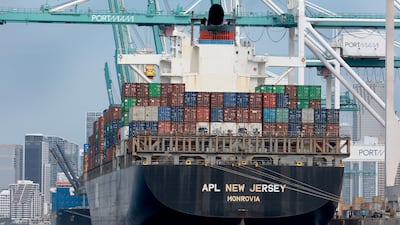The value of global trade rose by almost 15 per cent to a record $7.7 trillion in the first quarter of 2022, an increase of about $1tn compared with the same period last year, according to the UN Conference on Trade and Development (Unctad).
The trade value was about $250 million more than the fourth quarter of 2021, the UN body said in its 'Global Trade Update' report.
Trade in both goods and services surged in the January to March period.
Trade in goods reached nearly $6.1tn, an annual rise of about 25 per cent, while trade in services soared about 22 per cent yearly to $1.6tn. Trade growth is expected “to remain positive but continues to slow during the second quarter”, Unctad said.
In the first quarter, trade in goods was significantly above the 2021 levels in both developing and developed countries. Exports from developing and developed countries were about 25 per cent and 14 per cent higher year-on-year, respectively, in the three-month period.

Trade between developing countries was about 23 per cent higher in the first quarter compared with the same period in 2021, and about 42 per cent higher than the pre-Covid-19 pandemic levels.
“The war in Ukraine is starting to influence international trade, largely through increases in prices,” the report said.
Economic growth forecasts for 2022 are being revised downwards due to rising interest rates, inflationary pressures in several economies and negative global economic spillovers from the conflict in Ukraine. It is likely that global trade will reflect these macroeconomic trends, with a decrease in trade growth, according to Unctad.
“The conflict in Ukraine is putting further upward pressure on the international prices of energy and primary commodities,” the report said.
“In the short term, because of the inelastic global demand for food and energy products, rising food and energy prices would likely result in higher trade values and marginally lower trade volumes.”
In April, the International Monetary Fund lowered its 2022 global growth forecast to 3.6 per cent, down from its previous estimate of 4.4 per cent in January.
Last month, the World Bank slashed its growth forecast for the global economy for the second time this year as the Ukraine war, now in its fifth month, exacerbates the slowdown from the pandemic.
The Washington-based lender lowered its growth estimate for 2022 to 2.9 per cent, from the 3.2 per cent projection it issued in April.
In the first quarter, the value of global trade was about 30 per cent higher than the pre-pandemic levels of 2019. However, trade volumes increased to a much lower extent (about 6 per cent). The divergence between values and volumes is due to rising commodity prices, especially for energy products and general inflation, Unctad said.

The positive trend for international trade may soon come to an end, the report said.
Escalating interest rates and the winding down of economic stimulus packages will have a negative impact on trade volumes for the rest of the year. Volatility in commodity prices and geopolitical factors will also continue to make trade developments uncertain.
The evolution of world trade for the remainder of the year is also likely to be affected by various other factors including supply chain disruptions, transition towards a greener global economy and rising concerns for debt sustainability.
Trade patterns are expected to reflect the increasing global demand for products that are green or environmentally sustainable. This would largely depend on the implementation of government policies regulating the trade of carbon intensive products, Unctad said.
Given the rising levels of global debt, concerns of debt sustainability are likely to intensify in the coming quarters due to mounting inflationary pressures and associated interest rate hikes.
“The ongoing tightening of financial conditions is expected to heighten pressure on the most highly indebted governments, amplifying vulnerabilities and negatively affecting investments and international trade flows,” the report said.


